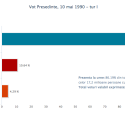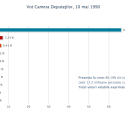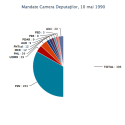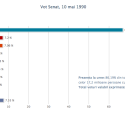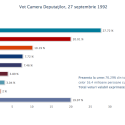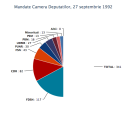IMPORTANT DEVELOPMENTS
- 1. Public safety. The Government intensifies safety controls and vows that no infected milk or dairy products have reached the public.
- 2. Schengen. The Government vows to continue working towards Romania’s accession to the Schengen Area and to the Euro Zone, but makes increasing European funds absorption rate its foremost priority.
- 3. JOBS. Prime Minister Victor Ponta assured the public that the Government is looking to adopt legislation that will ensure laid-off employees receive their due compensation packages.
- 4. Government: The RAAPPS will auction state-owned properties, in a major bid of the Government to increase the transparency of the institution and the efficiency of the management of state-owned real-estate.
- 5. POLITICAL DYNAMICS. The PDL elects Vasile Blaga as its new president, while incumbent President of Romania, Traian Basescu, threatens split from former party.
1. The Romanian Government has taken all necessary measures to ensure the safety of milk and dairy products
In response to the incidents where aflatoxine was discovered in milk products, the Government immediately took decisive action in order to ensure public safety and to prevent an economic scare in regards to dairy or milk products. According to the provisions of the national legislation, it is the operator’s duty to withdraw from the shelves products that do not meet safety standards. Precautionary withdrawals of merchandise have already taken effect.
Prime Minister Victor Ponta made it clear that no breach of the law will be tolerated and that the eventual culprits will be sanctioned. At the same time, the authorities emphasized that the withdrawal of products will be made with the approval and after the prior information of the public safety officials.
Companies in the food sector are working alongside the government in order to avoid or mitigate the risks posed by infected products. On repeated occasions, the state authorities have emphasized that all precautions have been taken in order to ensure the safety of the products reaching the public. Government spokesmen have emphasized that just as the horse-meat scandal actually emphasized the safety of the Romanian food sector and the vigilence of the authorities, so will the current situation highlight the Government’s concern for the consumers
Romanian dairy and milk are safer than ever. Over the last couple of weeks, 1300 analyses of milk or dairy produts were carried out, in comparison with the 15 tests of last year, which vow for the safety of the products on the shelves.
The USL Government reaffirmed its support for the national agriculture and for the farmers, emphasizing that the population was never at risk, since the contaminated lot of products was never on sale.
2. The USL wishes to adopt legislation that makes jobs safer
Romanian government officials called for the postponing of the effects of Government Emergency Ordinance No. 85/2009, which safeguards the interests of employees, after the latest wave of dismissals by Mechel Campia Turzii. The Ministry for the Economy, as well as the Justice Ministry emphasized that the Cabinet are looking for solutions to prevent another collective lay-off of the workers.
Government spokesmen emphasized that even though the company is owned by a private entity, the law has to safeguard the contractual obligations of the owners in relation to the employees. The USL government is looking for constitutional solutions that will ensure that the ownership of private enterprises assumes responsibility in regards to labor contracts.
3. Accession to the Schengen Area and to the Eurozone remain national priorities for Romania
Prime Minister Victor Ponta emphasized that accession to the Schengen Area remains a paramount objective for Romania, but that first priority shall be given to improving the country’s European funding absorption rate. Prime Minister Victor Ponta emphasized that the country’s development is highly dependent on a better management of the European funds Romania receives.
As Romania’s Schengen bid was blocked on fully political criteria and as the technical and institutional criteria for accession had been accomplished, the wisest strategy is waiting for a favorable political context for pressing with its Schengen accession bid.
As far as the accession to the Euro Zone is concerned, it remains a prominent objective of the Romanian Government. Senior USL figures have expressed their doubt in regards to a possible 2015 accession. While adopting the Euro is paramount in order to avoid the disheartening possibility of a “two-speed Europe”, Romania still has to register progress in increasing average wages, prices and purchase power. Even though the convergence criteria are already met, the Romanian economy needs to be prepared in order to accommodate to the single currency.
4. The government will sell off its protocol properties
The state agency responsible for managing state protocol (RAAPPS) apartments and real estate will proceed to selling all the state-owned properties in its portfolio, with the exception of four mansions and a block of flats. The 65 apartments in this building will be used to house ministers and state secretaries.
According to the legislative draft, ministers will have to leave these apartments 15 days after the end of their term, whereas state secretaries will be housed there for three months, until they find other accommodation.
The Government will auction these properties, even though there is no guarantee buyers will be found for all the properties. The USL government is nevertheless proving its commitment to bring transparency into the management of state-owned properties and is working hard to prevent that the state is used as a real-estate agency for people with political connections.
4. Traian Basescu reacts to the changes to the military’s statute
Traian Basescu’s latest intervention criticized the USL proposal to subject the Romanian military’s generals’ prolongation of activity prior to mandatory retirement to the approval of the Ministry of Defense. Basescu insisted that the Ministry’s approval represents the subordination of the Military to political interests.
Disregarding the principle of political oversight of the Military, Traian Basescu also disregards the overwhelming vote in favor of the USL, a vote for the reform of the official legal system of Romania. The only reason Traian Basescu is interested in the amendments to Law No. 80/1995 is because his influence over the Military is tempered by the new legal provisions.
Moreover, the new provisions do not force the Romanian generals into retirement as the president misleadingly claims; the mandatory retirement age remains the same. The President eschews the real problems confronting the Romanian military, their below standards provisioning and the under financing of the institution. In fact, it was the USL government that approved the greatest increase to the Romanian military’s funding in the last couple of years.
5. Vasile Blaga is the new PDL president
Vasile Blaga was elected the new president of the PDL after a victory over Traian Basescu’s protégée Elena Udrea. The national convention was marked by the incumbent president’s speech, which highlighted not only his ties with his former party (as per the provisions of the Romanian Constitution the incumbent president is prohibited from becoming a member of a political force), but also his need to find trustworthy political allies on the Romanian political scene, in order to fulfill his political program.
Even though Blaga was the favorite in the contest, due to his support among the ranks and file of the organization, Udrea’s presidential endorsement (highlighted by the presence of the President’s daughter, MEP Elena Basescu, among the closest followers), the increased visibility of her positions and her critical messages against Blaga’s side managed to make the final results closer than expected. Blaga received 2404 votes, Elena Udrea counted 2013, whereas Monica Macovei, the key figure of the reformist bid received only 191. It is important to note that in the moments following the announcement the reformist side was virtually indistinguishable from Udrea’s, showing once more where the loyalties of the PDL intellectuals lie and the purely rhetorical value of their presidency bid.
Blaga’s election was marred by accusations of electoral fraud during the internal campaign and after the counting of the votes had finished. Udrea pointed to an allegedly increased number of votes in relation to the number of previously approved voting delegates.
Following Blaga’s victory, Traian Basescu posted a Facebook video-message in which he said goodbye to his former party and announced his intention to found a new right-wing movement. The president alluded to the undemocratic actions of the victors during the counting of the ballots as the main reasons for his decision.
Pundits are speculating whether the new right-wing political force will be former PM Ungureanu’s Justice and Truth Alliance, which was formed only this week following the merger of his small Civic Force party and the remnants of the PNTCD. There are also doubts as to whether Udrea’s and the reformists’ departure will manage to dislodge an important share of the PDL rank and file. The claims of electoral fraud serve as a plausible justification for the losers of the PDL contest. The strategic imperative in the internecine conflict that now divides the former ruling party is the contest for its increasingly smaller share of the electoral votes, the figure of Basescu being definitely an advantage for the prospective break-away politicians.



